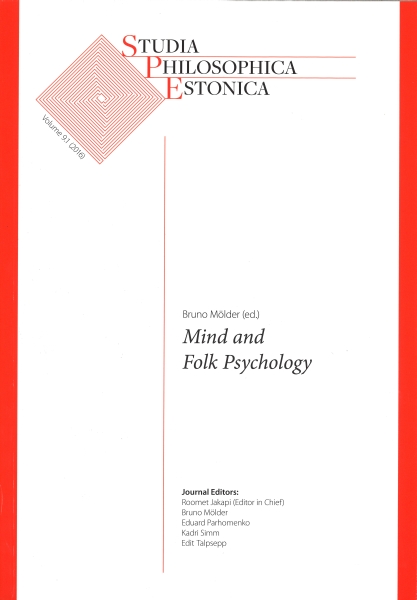Folk Psychology Revisited: The Methodological Problem and the Autonomy of Psychology
DOI:
https://doi.org/10.12697/spe.2016.9.1.02Keywords:
folk psychology, theory of mind, mindreading, autonomy of psychology, theory-theory, philosophical methodology, psychological languageAbstract
'Folk psychology' is a term that refers to the way that ordinary people think and talk about minds. But over roughly the last four decades the term has come to be used in rather different ways by philosophers and psychologists engaged in technical projects in analytic philosophy of mind and empirical psychology, many of which are only indirectly related to the question of how ordinary people actually think about minds. The result is a sometimes puzzling body of academic literature, cobbled together loosely under that single heading, that contains a number of terminological inconsistencies, the clarification of which seems to reveal conceptual problems. This paper is an attempt to approach folk psychology more directly, to clarify the phenomenon of interest, and to examine the methods used to investigate it. Having identified some conceptual problems in the literature, I argue that those problems have occluded a particular methodological confound involved in the study of folk psychology, one associated with psychological language, that may well be intractable. Rather than attempt to solve that methodological problem, then, I suggest that we use the opportunity to rethink the relationship between folk psychology and its scientific counterpart. A careful look at the study of folk psychology may prove surprisingly helpful for clarifying the nature of psychological science and addressing the contentious question of its status as a potentially autonomous special science.
References
Baron-Cohen, S., H. Tager-Flusberg, & D. Cohen, eds. (2000). Understanding Other Minds. Oxford: Oxford University Press, 2nd ed.
Bickle, J. (2003). Philosophy and Neuroscience: A Ruthlessly Reductive Account. Dordrecht, Kluwer.
Carnap, R. (1950). Empiricism, Semantics, and Ontology. Revue Internationale de Philosophie 4: 20-40.
Churchland, P.M. (1989). A Neurocomputational Perspective: The Nature of Mind and the Structure of Science. Cambridge: Bradford.
Duncan, D.J. (1983). The River Why. San Francisco: Sierra Club Books.
Fodor, J. (1974). Special Sciences (or: The Disunity of Science as a Working Hypothesis). Synthese 28: 97-115.
Greene, J.D. and Cohen, J.D. (2004). For the Law, Neuroscience Changes Nothing and Everything. Philosophical Transactions of the Royal Society of London B (Special Issue on Law and the Brain) 359: 1775-17785.
Hartner, D.F. (2012). Conceptual Analysis as Armchair Psychology: A Defense of Methodological Naturalism. Philosophical Studies 165(3), pp. 921-937.
Horgan, T. and Graham, G. (1991). In Defense of Southern Fundamentalism. Philosophical Studies 62: 107-134.
Horgan, T. and J. Woodward. (1985). Folk Psychology is Here to Stay. Philosophical Review, 94: 197-225.
Jackson, F. and Pettit, P. (1990). In Defence of Folk Psychology. Philosophical Studies 5: 7-30.
Marraffa M. (2011). Theory of Mind. Internet Encyclopedia of Philosophy. URL: http://www.iep.utm.edu/theomind. Accessed on 1 July 2015.
Morton, A. (1980). Frames of Mind. Oxford: Oxford University Press.
Nagel, T. (1974). What is it Like to be a Bat? Philosophical Review 83: 435-450.
Ravenscroft, I. (2010). Folk Psychology as a Theory. Stanford Encyclopedia of Philosophy, E. N. Zalta (Ed.) http://plato.stanford.edu/archives/fall2010/entries/ folkpsych-theory. Accessed on 1 July 2015.
Rudder-Baker, L. (1987). Saving Belief: A Critique of Physicalism. Princeton: Princeton University Press.
Schroeder, T. (2004). Three Faces of Desire. Oxford: Oxford University Press.
Sellars, W. (1956). Empiricism and the Philosophy of Mind. Minnesota Studies in Philosophy of Science, 1: 253-329.
Stich, S. (1983). From Folk Psychology to Cognitive Science. Cambridge: MIT Press.
Stich, S. and I. Ravenscroft (1994). What is Folk Psychology? Cognition, 50: 447-68.





